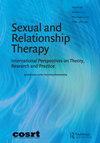Does anxiety sensitivity interfere with sexual well-being? Evidence from a community sample
IF 1.4
4区 心理学
Q3 PSYCHOLOGY, CLINICAL
引用次数: 0
Abstract
AbstractAnxiety sensitivity has been identified as a transdiagnostic risk factor with implications for problems in sexual well-being; those with higher anxiety sensitivity tend to experience poorer sexual well-being. The current study extended work examining links between anxiety sensitivity and sexual well-being to a community sample while taking into account broader psychological well-being. Participants were 484 men, women, and gender diverse adults (Mage = 31.70 years; SD = 11.26) who had engaged in partnered sexual activity at least once in their lifetime. We assessed sexual well-being broadly by including measures of sexual function, cognitive-affective responses (i.e. sexual satisfaction, sexual self-esteem, sexual distress), and sexual behavior (i.e. frequency of sexual activity, avoidance of sex). Multiple regression analyses showed that anxiety sensitivity is linked to poorer sexual well-being among men and women. Associations between anxiety sensitivity and sexual pain, sexual satisfaction (for women), and sexual distress persisted over and above the contributions of psychological well-being. Few gender effects were noted, suggesting that these experiences are common to all. Findings have clinical implications relevant to those working with individuals with anxiety or sexual problems.Lay SummaryWe tested the relation between anxiety sensitivity (fear of arousal-related body sensations like rapid heartrate) and sexual well-being. Data were collected from surveys completed by 484 adults. Results showed that having higher anxiety sensitivity was linked to more sexual pain, worse sexual satisfaction (for women), and more sexual distress.Keywords: Anxietyanxiety sensitivitydepressionsexual well-being AcknowledgementsThe authors would like to thank their team of undergraduate research assistants, Emily MacKenzie, Emma Giberson, Taylor McAulay, and Julia Keilty, for help with literature review, participant recruitment, and data management. They would also like to thank the participants for their time and contributions to the study.Disclosure statementThe authors have no known conflict of interest to disclose.焦虑敏感性是否会干扰性生活?来自社区样本的证据
摘要:焦虑敏感性已被确定为一种跨诊断风险因素,对性健康问题具有影响;焦虑敏感度高的人往往性生活更差。目前的研究将研究焦虑敏感性和性健康之间联系的工作扩展到一个社区样本,同时考虑到更广泛的心理健康。参与者是484名男性、女性和不同性别的成年人(年龄= 31.70岁;SD = 11.26),一生中至少有过一次伴侣性行为。我们通过包括性功能、认知情感反应(即性满足、性自尊、性痛苦)和性行为(即性活动频率、性回避)的测量来广泛评估性幸福。多元回归分析表明,焦虑敏感性与男性和女性较差的性健康有关。焦虑敏感性与性疼痛、性满足(女性)和性困扰之间的关联持续存在,超过心理健康的贡献。几乎没有注意到性别影响,这表明这些经历对所有人来说都是普遍的。研究结果对那些有焦虑或性问题的人有临床意义。我们测试了焦虑敏感性(对与觉醒相关的身体感觉的恐惧,比如心跳加快)和性幸福感之间的关系。数据收集自484名成年人完成的调查。结果显示,焦虑敏感性越高,性疼痛越多,性满意度越差(对女性来说),性困扰越多。作者要感谢他们的本科研究助理团队,Emily MacKenzie, Emma Giberson, Taylor McAulay和Julia Keilty,感谢他们在文献综述、参与者招募和数据管理方面的帮助。他们还想感谢参与者的时间和对研究的贡献。声明作者无已知利益冲突需要披露。
本文章由计算机程序翻译,如有差异,请以英文原文为准。
求助全文
约1分钟内获得全文
求助全文
来源期刊

Sexual and Relationship Therapy
PSYCHOLOGY, CLINICAL-
CiteScore
3.80
自引率
9.10%
发文量
37
期刊介绍:
Sexual and Relationship Therapy is a leading independent journal in its field, well established and internationally recognized. It offers an active, multidisciplinary forum for review and debate across the spectrum of sexual and relationship dysfunctions and therapies. The journal presents original research and best practice and is a vehicle for new theory, methodology, and application. Sexual and Relationship Therapy is edited by a respected international team and publishes contributions from around the world. It is the official journal of the British Association for Sexual and Relationship Therapy (BASRT).
 求助内容:
求助内容: 应助结果提醒方式:
应助结果提醒方式:


